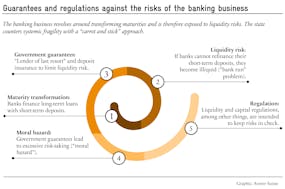Worldwide, investment controls are enjoying a revival. Proponents argue restrictions are essential to protect national security and economic interests and control takeovers by state-owned companies from emerging countries.
Swiss parliamentarians have been among those advocating tighter investment controls. But is “free trade in the investment sector” as naive, as often claimed? And which Swiss interests and industries are particularly worthy of protection? Moreover, it is unclear how exactly controls would be designed, who would be responsible for their implementation and how these might relate to other legal norms such as merger rules under competition law.

Host Samuel Rutz during the competition policy workshop. (Avenir Suisse)
Superfluous “homeland” protection
Whether Swiss companies really need protection against foreign takeovers was discussed intensively at this year’s competition policy workshop (the 11th in succession!). Skepticism predominated among speakers and participants, albeit partly for different reasons.
Simon Jäggi, Deputy Head of the Economic Policy Directorate at Seco, the Swiss economic authority, recalled that, in practice, the “national interest” is far too often used to camouflage “homeland security” so introducing investment controls could deter all foreign investors.
The EU, frequently accused of over-regulating, for years saw no need for investment controls. Only under pressure from larger member states like France and Germany was the “Ordinance on the Verification of Foreign Direct Investment” (valid from October 2020) issued this year. The new rule defines certain requirements for national investment controls, but in no way obliges individual member states to introduce them.
In the Swiss parliament, too, a motion is pending advocating controls. But Jäggi in his remarks recalled the government’s position on an open economy being a proven factor in Swiss prosperity. Furthermore, critical infrastructure in Switzerland is typically in public hands and therefore requires no additional protection.
Foreign experience shows investment controls are primarily used to pursue industrial policy goals. They usually create bureaucracy and bring scant benefits, making them neither effective nor necessary.
Daniel Daeniker, senior partner at leading law firm Homburger, also warned against new barriers. In recent history, opinion was always very skeptical towards certain foreign investors, and only the name of their country of origin changed over time. From about 2000, the rise of Sovereign Wealth Funds caused global unease; today it is Chinese takeovers that hit the headlines.
Foreign direct investments create jobs
For Switzerland, hands-on experience has spotlighted the value of openness. Technological cooperation has prompted innovation, while free trade and foreign direct investment have created jobs. Switzerland’s role as an international mediator has also often given local companies “first mover” advantages, such as in China. And Daeniker noted almost all the biggest companies on the Swiss stock exchange are already de facto in foreign hands, based on shareholder origins.
Andreas Heinemann, president of Switzerland’s Antitrust Board (Weko), stressed the problems to be expected if investment controls were ever implemented, especially if the Weko were to be entrusted with supervision. Takeovers could not simply be “attached” to classic merger control, as there are virtually no points of contact between competition and investment restrictions. “National security” has nothing in practical terms to do with the objectives of competition law.
Abuse of antitrust law
That approach is confirmed by practice in neighboring countries, where investment controls never lie with the competition authority – the UK being the most notable exception. Heinemann remarked that Weko’s lawyers and economists would lack the technical expertise to conduct a “national security” review of investment projects. More generally, he warned against the growing danger of antitrust law being abused for protectionist purposes.
Avenir Suisse’s senior fellow Marco Salvi cautioned against throwing the baby out with the bathwater by emphasizing the economic facts. Among OECD members, Switzerland was already a major investment location: the level of foreign direct investment had risen from less than 10 percent of GDP in 1985 to just under 130 percent of GDP by 2015. The vast majority, almost 80 percent, of these capital flows came from Europe. So when politicians raised “threats” from abroad, they are mostly talking about non-Europeans, notably China.
The bare figures show, however, that the “yellow peril” is much smaller than believed. And the “myth of Switzerland without frontiers” is misleading too: in nine sectors, critical infrastructure is already subject to supervision by the federal government, and “systemically relevant” companies face special regulations. Last but not least, access to the real estate market is restricted by the so called “Lex Koller”, which limits foreign purchases, and the legal form of a public limited company under special law safeguards against unwanted takeovers. So Switzerland’s arsenal for checking and preventing undesired investments is already well stocked – some would even say too much so.






